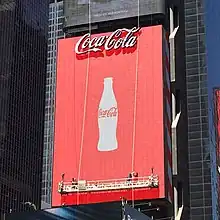Coca-Cola sign
The Coca-Cola sign is an electro-kinetic sculpture on the Two Times Square building in Times Square, Manhattan, New York City. The current sign, installed in 2017, is 68 feet (21 m) tall and 42 feet (13 m) wide, and is the latest in a line of Coca-Cola Times Square signs dating back to 1920.[1]

The new sign was installed in 2017, starting with the removal of the old sign in February. Construction of the new sign started in March, and the new sign was finished and premiered on August 8, 2017. Guinness World Records has awarded the sign the title of the "first 3D robotic billboard".[2]
History and design
Early signs (1920–2003)
The first Coke Times Square debuted in 1920 at 49th Street and Broadway with neon lighting being added in 1923. It flashed the words "Drink Coca-Cola, Delicious and Refreshing" and was the world's second-largest electric billboard at the time. This sign was replaced in 1932 with a new sign on 47th Street which highlighted a soda jerk, and was replaced again in the 1960s with a simpler sign that read, "The Pause That Refreshes."[3] By the mid 1960s, the slogan "Things Go Better With Coke" was the latest slogan on the sign.
In late October 1969, Coca-Cola embarked on a multimillion-dollar advertising campaign which at its helm was a new logo for the company, in which the trademark was housed in a square with a "dynamic ribbon" near the bottom. A large electric sign, which alternated the new look and slogan "It's the Real Thing" in vibrant and eclectic red and white color patterns, replaced the previous one, remaining installed at Times Square for over 20 years.
The sign wouldn't be updated again until 1991, with the addition of a $3 million, neon-illuminated display, which featured a Coke bottle as the centerpiece. The Coke bottle displayed was the world's largest Coca-Cola bottle, and the sign featured both daytime and evening routines.[3]
2004 sign
The 1991 sign was replaced in 2004 by a new Coke sign. The Coca-Cola Company and MoMA (The Museum of Modern Art) selected Brand Architecture's distinctive design from fifteen design firms from the United States.
The multi-layered billboard had a complex pattern of stainless steel planes and exposed superstructure. The sign's design was inspired by Manhattan's steel and glass monoliths and the frenetic pace of midtown street traffic. The three-dimensional composition rendered the Dynamic Ribbon Device in both positive form and negative space. The display also offered the possibility of live video streaming across the sign's curvature. Built by digital LED display manufacturer Daktronics and titled "Simply Coke," the sign was covered in programmable light-emitting diodes and allowed graphics to be displayed.
The sign attained 180-degree visibility by sculpting LED panels around the 8 foot (2.4 m) horizontal thrust. Wright Massey, owner of Brand Architecture Inc. and creator of the sign, said, "We realized that a vibrant, simple design would draw focus in the frenzied pandemonium of Times Square. Drawing from recent Coca-Cola marketing research, we found the Dynamic Ribbon Device the best vehicle for conveying key brand values. We wanted a contemporary, authentic statement, full of energy, optimism, and youthful spirit. We wanted our sculpture to inspire consumers on all three emotional levels: head, heart and gut."
During the unveiling ceremony on July 1, 2004, which was also in the middle of an advertising campaign for Coca Cola C2, the sign showed "The Time Machine", a tribute to the past of Coca Cola and New York City, soon after activation.[4][5]
2017 sign
The 2017 sign measures approximately 68 by 42 feet (21 by 13 m) and contains 1,760 LED cubes that can move independently. The cubes are programmed to move in several preset configurations over the course of the day, producing different images. Some images are designed solely to elicit moods, while others communicate product names, seasonal promotions, and corporate logos in different languages. The images vary with the time of day and the season.[1]
The sign was designed and built by Space150 and Radius Displays, with sign testing, management, and assembly by other businesses.[6]
Gallery
 The 2004 Coca-Cola sign, which was replaced in 2017 by the current sign.
The 2004 Coca-Cola sign, which was replaced in 2017 by the current sign. At the unveiling of the 2004 Coca-Cola sign, silhouettes of construction workers add the final touches
At the unveiling of the 2004 Coca-Cola sign, silhouettes of construction workers add the final touches
See also
- Candler Building, the former Coca-Cola headquarters on 42nd Street
References
- "News - Coca-Cola Stories & More | The Coca-Cola Company". www.coca-colacompany.com.
- "First 3D robotic billboard". Guinness World Records.
- "Coca-Cola, Times Square and the 'Power of Presence': The Coca-Cola Company". www.coca-colacompany.com. Archived from the original on 2017-08-15.
- http://www.coca-colacompany.com/stories/coke-lore-times-square Coke Lore- Coca-Cola Unveils a New Sign in Times Square
- Collins, Glenn (June 21, 2004). "In Times Square, Coke Puts On a Flashier Face; In the Age of Infinite Ads, Only an 882,112-Pixel Supersign Will Do". The New York Times.
- "Coca-Cola Times Square Sign: Partner Credits: The Coca-Cola Company". www.coca-colacompany.com. Archived from the original on 2017-08-15.
External links
 Media related to Coca-Cola sign (Two Times Square) at Wikimedia Commons
Media related to Coca-Cola sign (Two Times Square) at Wikimedia Commons